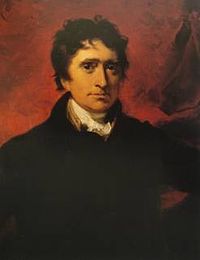Thomas Erskine, 1st Baron Erskine
|
The Right Honourable The Lord Erskine KT PC KC |
|
|---|---|
 |
|
| Lord Chancellor | |
|
In office 1806–1807 |
|
| Monarch | George III |
| Prime Minister | The Lord Grenville |
| Preceded by | The Lord Eldon |
| Succeeded by | The Lord Eldon |
| Personal details | |
| Born |
10 January 1750 Edinburgh |
| Died | 17 November 1823 (aged 73) Almondell, Linlithgowshire |
| Nationality | British |
| Political party | Whig |
| Spouse(s) | (1) Frances Moore (d. 1805) (2) Sarah Buck (d. 1856) |
| Alma mater | Trinity College, Cambridge |
Thomas Erskine, 1st Baron Erskine KT PC KC (10 January 1750 – 17 November 1823) was a British lawyer and politician. He served as Lord Chancellor of the United Kingdom between 1806 and 1807 in the Ministry of All the Talents.
Erskine was the third and youngest surviving son of Henry Erskine, 10th Earl of Buchan, and was born in a tenement at the head of South Grays Close on the High Street in Edinburgh. His older brothers were David (Lord Cardross and later the 11th Earl of Buchan) and Henry (later Lord Advocate of Scotland). His mother, Agnes Steuart, was the daughter of a solicitor general for Scotland and undertook much of her children's education as the family, though noble, were not rich. The family moved to St Andrews, where they could live more cheaply, and Erskine attended the grammar school there. The family's money having been spent on the education of his older brothers, Erskine, aged fourteen, reluctantly abandoned his formal education for the time being and went to sea as a midshipman. His family meanwhile moved to Bath to become members of the Methodist community headed by Selina, Countess of Huntingdon. One of Erskine's sisters, Anne Agnes, was to become treasurer of Selina, Countess of Huntingdon's charities.
Erskine went to sea as a midshipman in the Tartar, under captain Sir David Lindsay, who was a nephew of Lord Mansfield and a friend of the Erskine family. The Tartar set sail for the Caribbean, where Erskine was to spend the next four years, rising to the rank of acting lieutenant. When Erskine was eighteen he resigned from the Navy. His ship had been paid off, there were no commissions available, and he didn't want to return to sea as a midshipman after having been an acting lieutenant. The 10th Earl of Buchan had recently died, and Erskine now had just enough money to buy a commission in the army, becoming an ensign in the 1st (Royal) Regiment of Foot. He was stationed first at Berwick and then on Jersey. On 29 March 1770 Erskine married Frances Moore at Gretna Green, against the wishes of her father, Daniel Moore who was member of parliament for Great Marlowe. Frances was the granddaughter of John Moore, who had been attorney general of Pennsylvania. Erskine's regiment was then posted to Minorca, and Frances went with him. Before meeting Frances, Erskine had written about the qualities he was looking for in a bride: "Let then my ornament be far from the tinsel glare, let it be fair yet modest, let it rather delight than dazzle, rather shine like the mild beams of the morning than the blaze of the noon. I seek in my fair one a winning female softness both in person and mind". Erskine appears to have found these qualities in Frances: she is described on her memorial in Hampstead Church as "the most faithful and affectionate of women". The couple had four sons and four daughters.
...
Wikipedia
